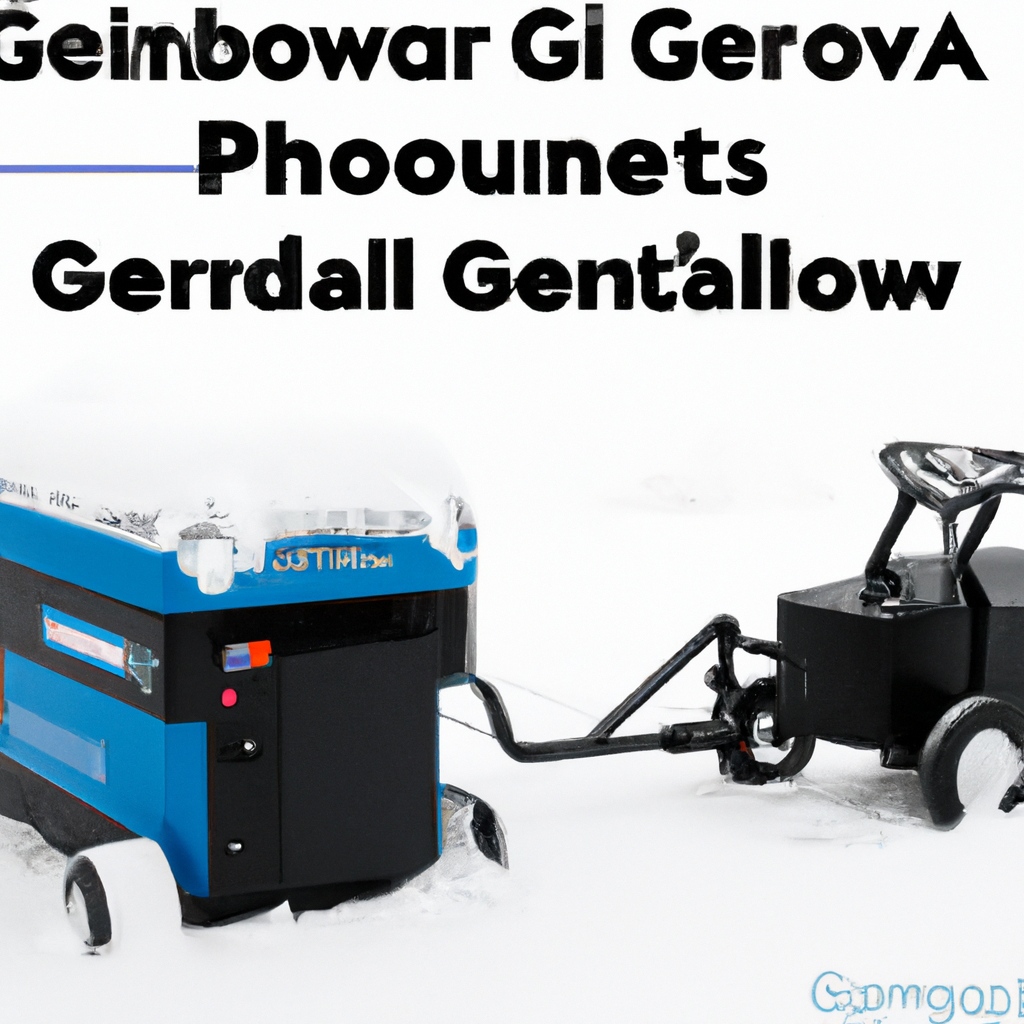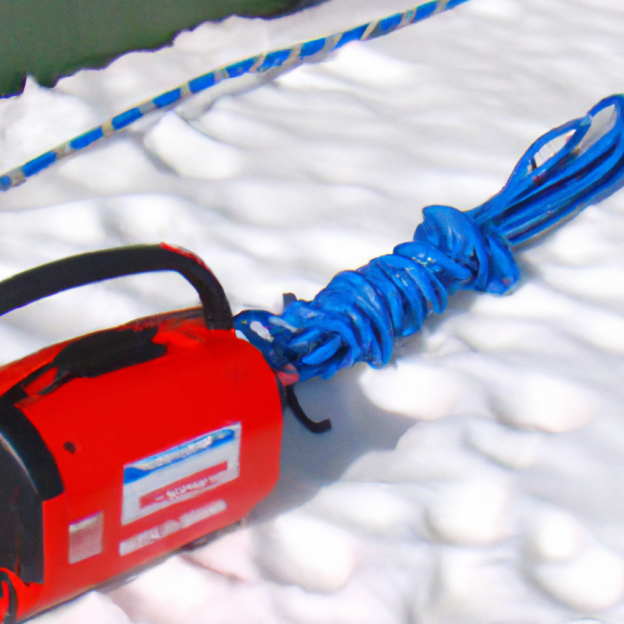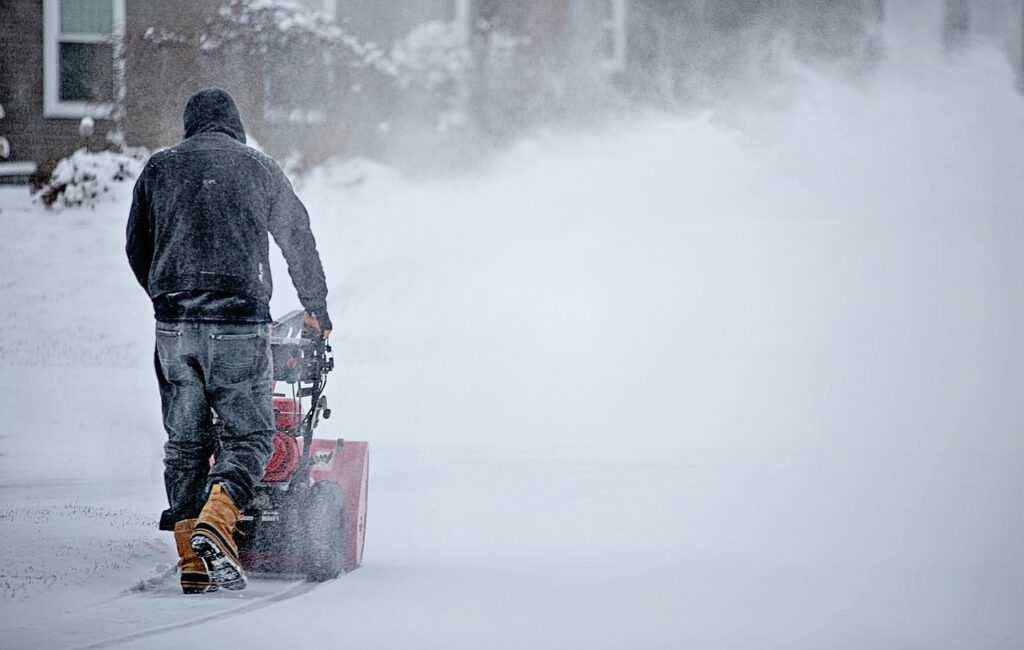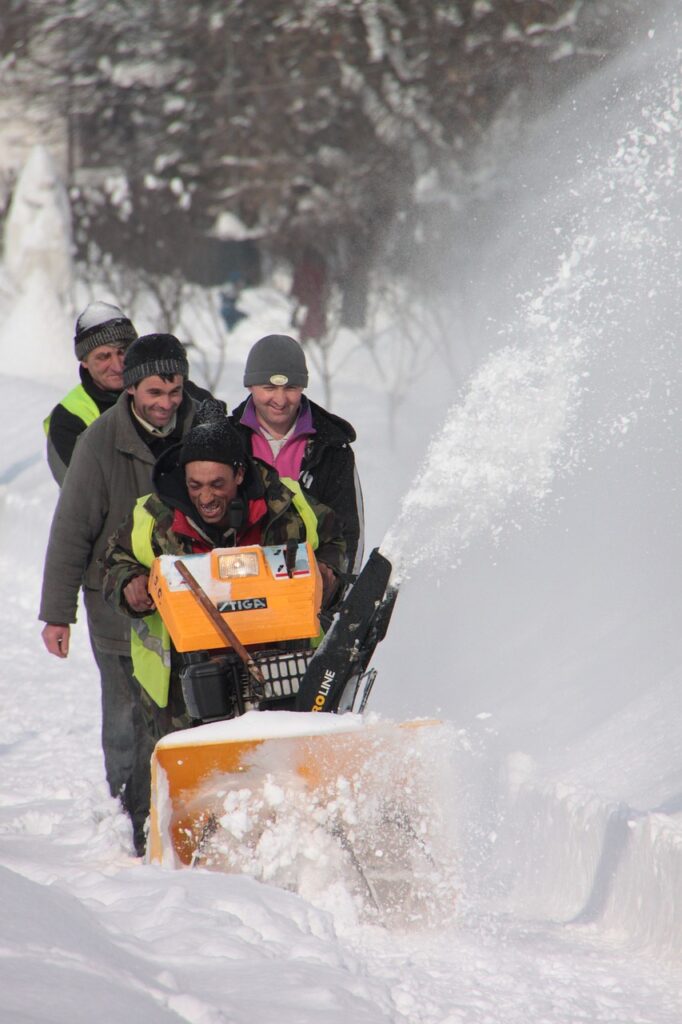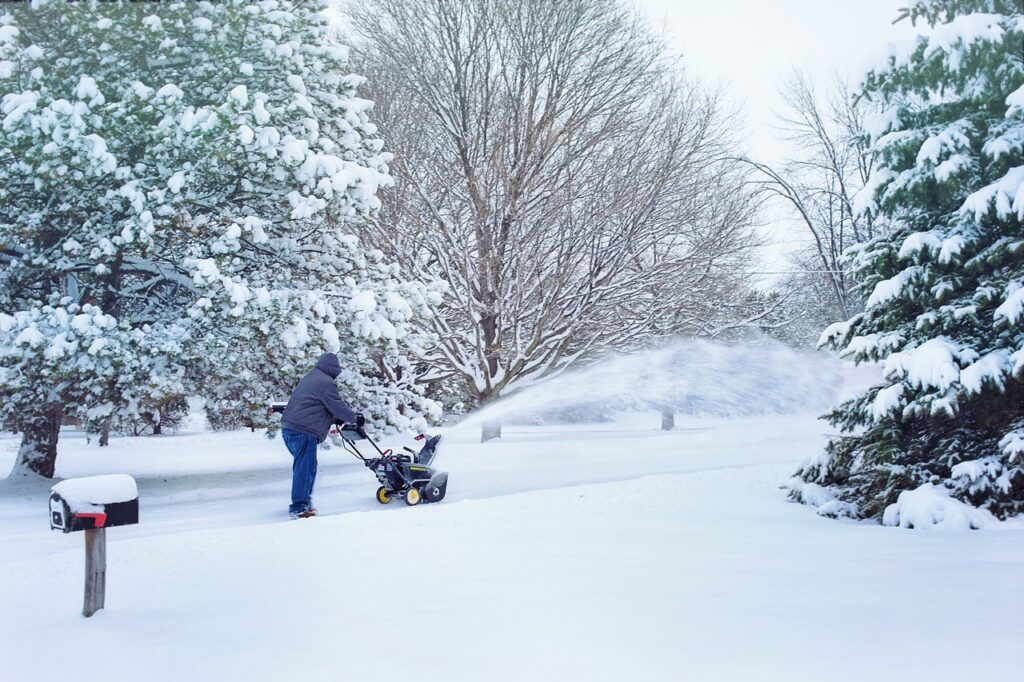So you’ve finally decided to invest in an electric snowblower to make removing snow from your driveway a breeze. But before you start clearing away that winter wonderland, there’s an important question to tackle: what kind of extension cord should you use? Choosing the right cord is crucial for ensuring optimal performance and safety while operating your snowblower. In this article, we’ll break down the key factors to consider when selecting an extension cord to power up your electric snowblower, so you can bid farewell to shoveling and hello to effortless snow removal.

Cord Gauge
Understanding cord gauge
When it comes to extension cords, one of the key factors to consider is the cord gauge. Cord gauge refers to the thickness of the wire inside the cord. The gauge of the cord determines its capacity to carry electrical current. In simple terms, the lower the gauge number, the thicker the wire and the more current it can handle.
For snowblowers, which often require a significant amount of power, it is crucial to choose the right gauge for your extension cord. Using a cord with insufficient gauge can result in voltage drop, overheating, and potential damage to your snowblower or the cord itself. On the other hand, using a cord with a higher gauge than necessary is not only unnecessary but can also be less efficient.
Selecting the right gauge for your snowblower
To determine the appropriate gauge for your snowblower, you need to consider the power requirements of the machine. Snowblowers typically come with a specified amperage rating, which is a measure of how much current they draw.
As a general rule, for snowblowers with amperage ratings of up to 5 amps, a 16-gauge cord will suffice. For snowblowers with amperage ratings between 5 and 10 amps, a 14-gauge cord is recommended. If your snowblower has an amperage rating higher than 10 amps, it is best to use a 12-gauge cord.
It is worth noting that longer cords may require a larger gauge to compensate for potential voltage drop over the distance. If you need a longer extension cord, consider using a lower gauge to ensure optimal performance.
Cord Length
Determining the appropriate cord length
When it comes to cord length, it is important to strike a balance between convenience and efficiency. Using a cord that is too short can limit your mobility and require you to constantly move the snowblower to reach different areas. On the other hand, using a cord that is too long can result in voltage drop and power loss.
To determine the appropriate cord length, consider the layout of your outdoor space and the distance between the nearest power outlet and the areas you need to clear with your snowblower. It is advisable to measure the distance beforehand to ensure you select a cord that is long enough without being excessive.
Considerations for cord length
In addition to the distance between the power outlet and the snowblower, there are a few other factors to keep in mind when deciding on the cord length. These include safety, convenience, and potential hazards.
Ensure that the cord length allows for safe use of the snowblower without creating an obstacle or tripping hazard. It is also important to consider the location of the power outlet and whether it is easily accessible.
Additionally, keep in mind that longer cords can be more prone to tangling and require proper storage to prevent damage or accidents. Consider investing in cord organizers or reels to keep your extension cord neat and tangle-free when not in use.
Outdoor Rated
Importance of outdoor rated extension cords
When using any electrical appliance or equipment outdoors, it is vital to prioritize safety. This is where outdoor rated extension cords come into play. These cords are specifically designed and constructed to withstand the rigors of outdoor use, including exposure to moisture, temperature variations, and physical stress.
Using an indoor-rated cord outdoors can pose serious safety hazards, as it may not have the necessary insulation and protective features. Outdoor rated extension cords are built with weather-resistant materials and are often labeled as such, making them the ideal choice for powering your snowblower in outdoor conditions.
Choosing extension cords specifically designed for outdoor use
When selecting an extension cord for your snowblower, ensure that it is explicitly designed for outdoor use. Look for cords that are labeled as “outdoor rated” or “suitable for outdoor use.” This designation confirms that the cord has been tested and certified to meet the safety requirements for outdoor applications.
Outdoor rated cords often have additional features such as UV resistance, which protects against sun damage, and extra insulation, which prevents moisture penetration. These features enhance the longevity and reliability of the cord, ensuring safe and efficient operation of your snowblower in diverse weather conditions.

Amp Rating
Understanding amp rating
The amp rating of an extension cord refers to the maximum current it can handle without overheating or becoming damaged. It is crucial to select a cord with an amp rating that matches or exceeds the amperage rating of your snowblower. If the cord’s amp rating is lower than the snowblower’s amperage, it can lead to overheating and potentially cause a fire hazard.
To determine the amp rating of your snowblower, refer to its user manual or the information label on the machine itself. The manual or label will specify the amperage the snowblower draws during operation. Always choose an extension cord with an amp rating equal to or higher than the snowblower’s amperage to ensure proper and safe functionality.
Matching the amp rating of the extension cord
Once you know the amperage of your snowblower, it is essential to select an extension cord with a matching or higher amp rating. As a general guideline, for snowblowers with amperage ratings up to 10 amps, a 16-gauge cord should be sufficient. For snowblowers with amperage ratings between 10 and 15 amps, a 14-gauge cord is recommended. If your snowblower has an amperage rating higher than 15 amps, a 12-gauge cord is advisable.
Matching the amp rating eliminates the risk of the extension cord becoming a bottleneck and ensures it can safely carry the current required by your snowblower. It is always better to err on the side of caution and choose a cord with a higher amp rating than necessary, as this provides an extra margin of safety.
Cord Material
Different cord materials available
Extension cords are made from various materials, each with its own characteristics and suitability for different applications. The most common materials used in extension cords are vinyl, rubber, and thermoplastic.
Vinyl cords are cost-effective and offer good flexibility, but they can become stiff in cold weather and are less durable compared to rubber cords. Rubber cords, on the other hand, are more durable and remain flexible even in cold temperatures, making them ideal for winter use with snowblowers. Thermoplastic cords are a good middle-ground option, offering flexibility, durability, and resistance to harsh weather conditions.
Evaluating the durability and flexibility of the cord
When choosing the material for your extension cord, evaluate both durability and flexibility. Rubber cords excel in both categories, making them a popular choice for snowblowers. Their durability ensures they can withstand rough handling, accidental tugs, and exposure to outdoor elements. Additionally, their flexibility allows for easy maneuverability of the snowblower without the risk of the cord getting kinked or damaged.
Vinyl and thermoplastic cords are suitable choices for less demanding applications or occasional use, but they may not hold up as well to the harsh conditions encountered during snow clearing. If you anticipate using your snowblower frequently or in severe weather conditions, invest in a rubber cord to ensure optimal performance and longevity.
Weather Resistance
Ensuring the extension cord is weather resistant
Since snowblowers are primarily used outdoors, it is essential to choose an extension cord that is weather resistant. Weather resistance entails protection against moisture, temperature variations, and other outdoor elements. Failure to use a weather-resistant cord can lead to electrical malfunctions, safety hazards, and potential damage to the snowblower or connected devices.
Look for extension cords labeled as “weather resistant,” “water resistant,” or “outdoor rated” to ensure they meet the necessary standards for use in outdoor environments. These cords are designed to withstand the challenges posed by rain, snow, ice, and other weather conditions, keeping you safe while operating your snowblower.
Protection against moisture and temperature variations
A key feature of weather-resistant cords is their ability to repel moisture and resist the effects of temperature fluctuations. Snow, rain, and other forms of moisture can be detrimental to the functioning of non-weather-resistant cords, as they can penetrate the insulation and reach the bare wires, leading to short circuits or electrical shocks.
Weather-resistant cords feature specialized insulation and sheathing that provide a barrier against moisture. They also have enhanced resistance to temperature extremes, preventing the cord from becoming brittle in cold weather or losing its protective qualities in high temperatures. Using a weather-resistant cord ensures that your snowblower operates safely and reliably in various weather conditions.
Outlet Compatibility
Matching the extension cord plug to the outlet
To ensure compatibility and safe operation, it is important to select an extension cord with a plug that matches the outlet you will be using. The plug’s design and configuration should align correctly with the receptacle to establish a secure and reliable connection.
Most outdoor outlets have standard 3-prong receptacles, so selecting an extension cord with a 3-prong plug is generally appropriate. However, it is still necessary to assess the specific requirements of your outlet to confirm compatibility.
Considering connector types and configurations
In addition to the plug style, it is also crucial to consider connector types and configurations. Some outlets may have unique configurations, such as twist-lock or NEMA L5-30R, which require corresponding connectors on the extension cord. These specialized connectors provide additional locking mechanisms for a more secure connection and prevent accidental disconnections.
Before purchasing an extension cord, identify the specific type of outlet you will be using and ensure the cord is equipped with the appropriate plug and connector configurations. This compatibility ensures a safe and reliable power supply from the outlet to your snowblower.
Cord Capacity
Determining the power requirements of your snowblower
Determining the power requirements of your snowblower is crucial in selecting an extension cord with sufficient capacity. The power requirements are usually measured in watts or amps and can be found in the snowblower’s user manual or on its information label.
To calculate the power requirements in watts, multiply the voltage (typically 120V for residential outlets) by the amperage rating. Alternatively, if the snowblower provides the power requirements in amps, you can use that directly.
Selecting an extension cord with sufficient capacity
Once you have determined the power requirements of your snowblower, you need to choose an extension cord with matching or higher capacity. Make sure the cord’s amp rating can handle the current draw of your snowblower without exceeding its maximum capacity.
As mentioned earlier, for snowblowers with amperage ratings up to 10 amps, a 16-gauge cord should suffice. For amperage ratings between 10 and 15 amps, a 14-gauge cord is recommended. If your snowblower exceeds 15 amps, a 12-gauge cord is necessary to ensure the cord can safely carry the required current.
Selecting an extension cord with sufficient capacity minimizes the risk of voltage drop and ensures that your snowblower receives the power it needs to operate effectively.
Safety Features
Built-in safety features of extension cords
When it comes to electrical equipment, safety should always be a top priority. Extension cords are designed with several built-in safety features to enhance their safe usage.
One essential safety feature is a grounded plug, which prevents electric shocks and reduces the risk of electrical fires. Grounded plugs have three prongs: two blade-like prongs for the live and neutral wires and a round prong for the ground connection. The ground prong provides an extra path for electrical current to travel safely into the earth, protecting you from potential hazards.
Another safety feature to look for is a surge protector. Surge protectors safeguard your snowblower and other connected devices from power surges, which can occur due to lightning strikes or fluctuations in the electrical grid. These surges can damage your snowblower’s electrical components, but a surge protector helps divert excess voltage to protect the equipment.
Choosing cords with grounded plugs and surge protectors
When selecting an extension cord for your snowblower, prioritize cords with grounded plugs and surge protectors. The grounded plug ensures that any potential electrical faults are safely redirected, while the surge protector defends against power surges that can damage the snowblower or other electrical devices.
Using cords with these built-in safety features provides peace of mind and reduces the risk of electrical accidents and damage to your snowblower. Always inspect the cords periodically to ensure the safety features are working correctly and replace them if any damage is detected.
Additional Considerations
Proper cord storage and maintenance
To prolong the life of your extension cord and ensure its safe and efficient use, proper storage and maintenance are critical. Here are a few tips:
- Avoid tightly coiling the cord, as this can cause internal damage and make it prone to tangling. Instead, loosely coil the cord or use a cord organizer or reel to keep it neatly stored.
- Store the cord in a clean and dry location, away from direct sunlight and extreme temperatures. Exposure to sunlight and excessive heat can degrade the cord’s insulation, compromising its safety.
- Regularly inspect the cord for any signs of wear, damage, or frayed insulation. If you notice any issues, replace the cord immediately to prevent potential hazards.
- Never plug or unplug the cord from the outlet or snowblower while standing on wet ground or in wet conditions. Always ensure the area is dry before handling the cord or electrical equipment.
By following these storage and maintenance practices, you can extend the lifespan of your extension cord and ensure safe operation during snow removal.
Avoiding overheating and overloading
Overheating and overloading are serious concerns when using extension cords, as they can lead to cord damage, electrical malfunctions, and even fires. To avoid these risks:
- Do not overload the extension cord by plugging in multiple high-powered devices simultaneously. Stay within the cord’s amp rating and power capacity.
- Periodically check the cord during use to ensure it is not becoming excessively warm or hot to the touch. If you notice significant heat buildup, disconnect the cord immediately and investigate the cause.
- Avoid running the cord under carpets or rugs, as this traps heat and can lead to overheating. Ensure the cord is positioned in a well-ventilated area, away from flammable materials.
By being mindful of these tips, you can minimize the chances of overheating and overloading, ensuring the safe and efficient operation of your snowblower.
In conclusion, selecting the right extension cord for your electric snowblower is essential for ensuring safe and optimal performance. Consider factors such as cord gauge, length, outdoor rating, amp rating, material, weather resistance, outlet compatibility, cord capacity, and safety features. By paying attention to these considerations and following proper storage and maintenance practices, you can enjoy hassle-free snow removal while keeping safety a top priority. Stay warm and safe during those snowy days!

